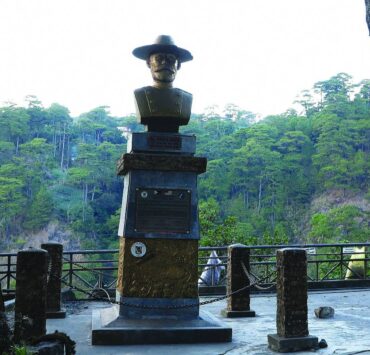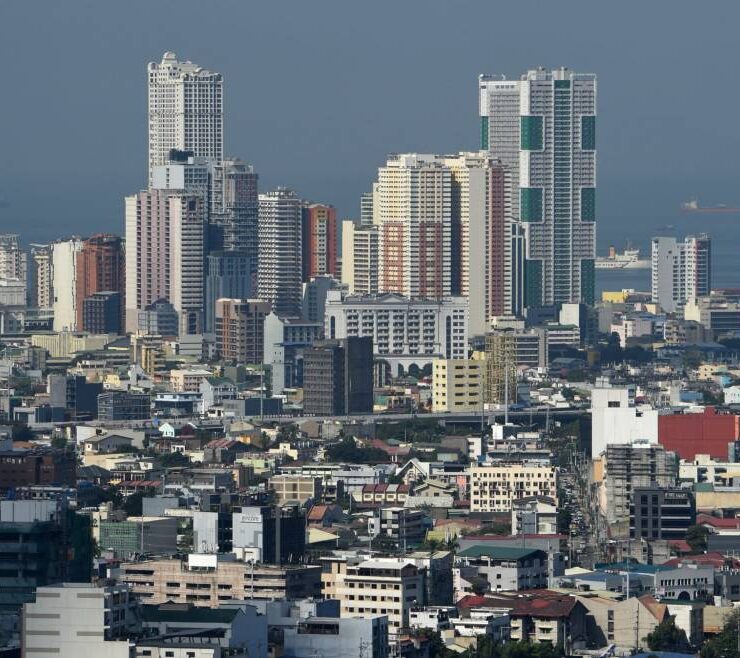Livelihood run by women aims to ‘nurse’ Pasig River
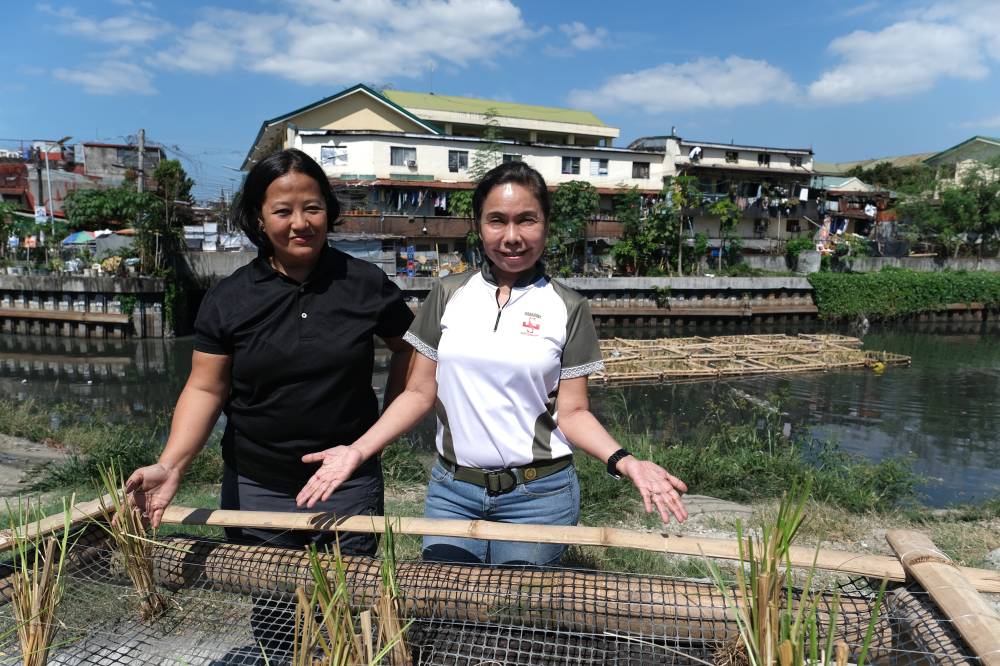
Aloha Ponayo’s work is rooted in soil—quite literally.
In years past, Ponayo, 49, made a living doing laundry for others. Now, she trains communities across the country in propagating vetiver grass.
“It helps me a lot because before, I would do laundry work and take home P300, P500. Now, training others [to plant vetiver], I can earn P1,000 or sometimes even above that,” Ponayo tells the Inquirer in Filipino.
Vetiver has seen growing use in the prevention of soil erosion and absorption of pollutants in bodies of water. Ponayo is one of the trainers of Vetiver Farms Philippines, which bills itself as the “pioneer in commercial propagation of vetiver grass” in the country and is run by entrepreneur Noah Manarang.
“It can withstand all kinds of toxic elements. The important characteristic is that it is resistant to most pests, and it has what we call phytoremediation properties. It cleans contaminated, polluted soil and water,” explains Manarang, who has been propagating vetiver since the ’90s.
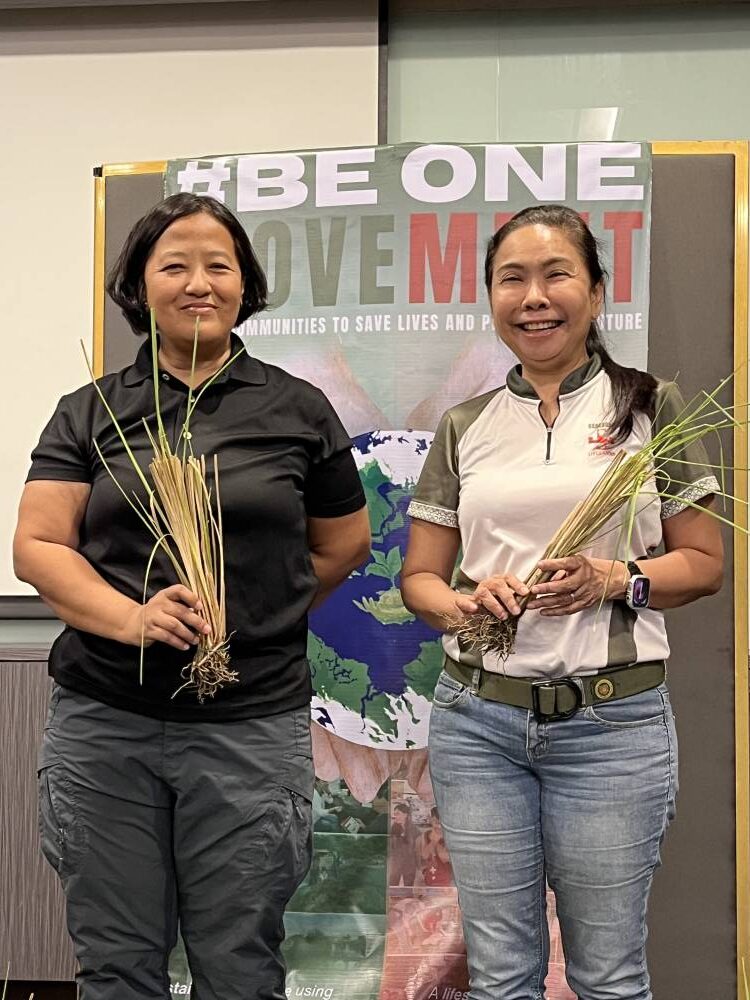
What makes this noninvasive grass special is that it can grow anywhere—from steep slopes to river banks, from lahar to adobe and even in landfills. With roots that can reach 3 meters deep, it is particularly helpful in maintaining soil integrity. Using vetiver against soil erosion was popularized in Thailand by no less than the late King Bhumibol.
Locally, Manarang shares that the grass is increasingly being used by government agencies like the Department of Environment and Natural Resources and the Department of Public Works and Highways. Real estate companies have been using it for soil erosion control as it is cheaper than conventional technologies.
Vetiver can also be planted in pontoons or rafts made of bamboo, with these contraptions being kept afloat in rivers or ponds. It can absorb pollutants and toxic chemicals, and even bring these otherwise dead bodies of water back to life, says Manarang.
She narrates examples from her corporate clients, with one photo showing brown vetiver grass. “We thought that the grass in the pontoon was dying … So when we harvested the grass—this is already dead water, there was already no organic matter—[we saw that] it instead thrived. And you can see the color of the roots, that’s the heavy metals that it absorbed. It’s a visual representation of how vetiver cleans.”
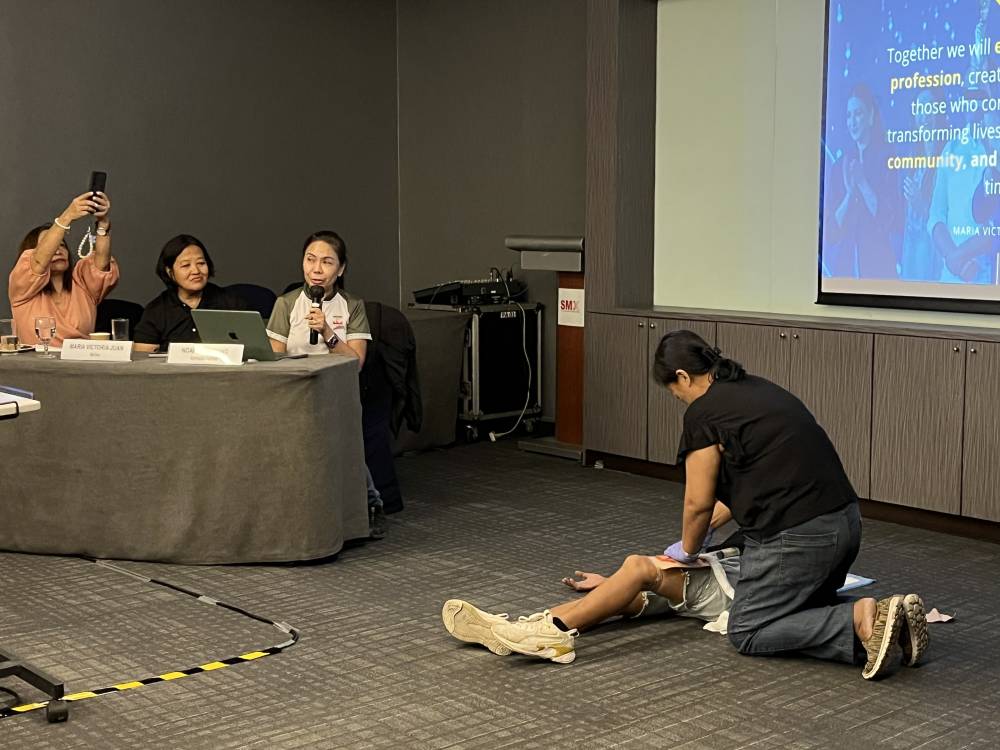
Under Manarang’s leadership, Vetiver Farms goes to communities to train people, mostly women and senior citizens, on how to propagate the grass. One of these projects was in Barangay 190, Pasay City, where, in 2018, Manarang was able to teach Ponayo.
They planted the grass in pontoons placed on the part of the Pasig River adjacent to their barangay. The grass, after two to three months, was harvested from the pontoons and the planting slips were sold back to Vetiver Farms for large-scale projects, at a peso or two per plant.
As one vetiver plant multiplies to about seven to eight per harvest, this program not only helps the enterprise with the need for plants in its various projects but also provides livelihood for communities.
“Our advocacy is to give work to those who can’t easily get work. Who are those? Women, senior citizens … beside the project site, we prioritize them in cooperation with the barangay,” says Manarang.
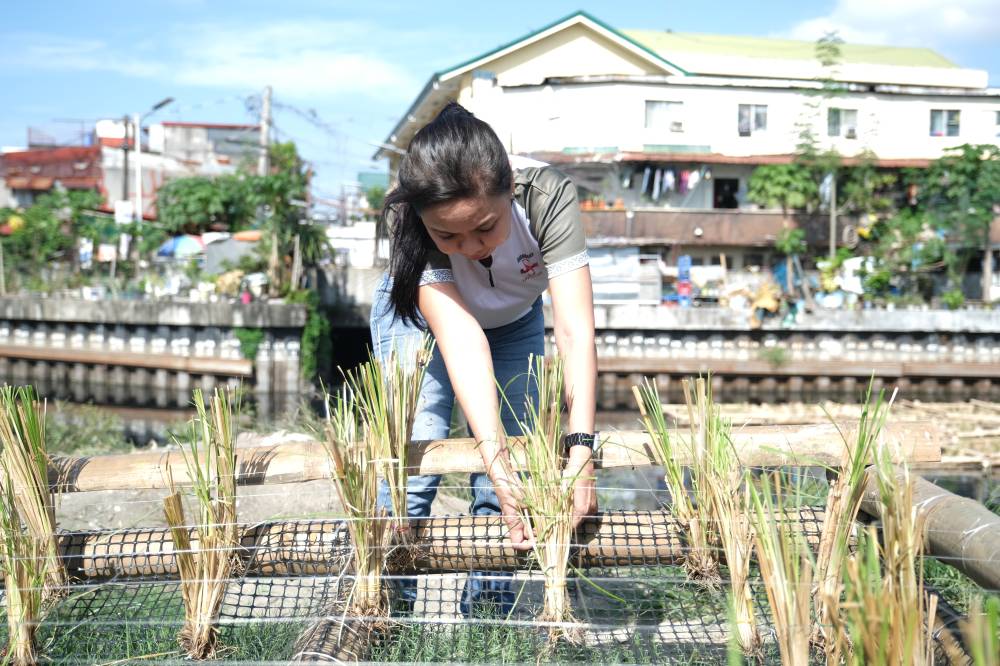
That run in Barangay 190, which had been started in coordination with Light Rail Manila Corp., was so successful—in terms of community engagement as well as harvests and profits—that it only stopped when the pontoons were destroyed by a typhoon. The pandemic also paused progress in the community.
However, a group of trainers like Ponayo, was born out of it. Ponayo is now tapped by Vetiver Farms to teach its clients and partners how to propagate the grass.
“It may seem hard at first, especially [with] those pontoons. But, of course, as you get the hang of it, you would realize that it’s easy, especially if you really want to do it,” Ponayo relates.
“Vetiver helped me and others who previously had difficulties to make ends meet. Here I am now, training [others] and earning money out of it, being trusted [to teach] even in faraway places,” Ponayo adds.
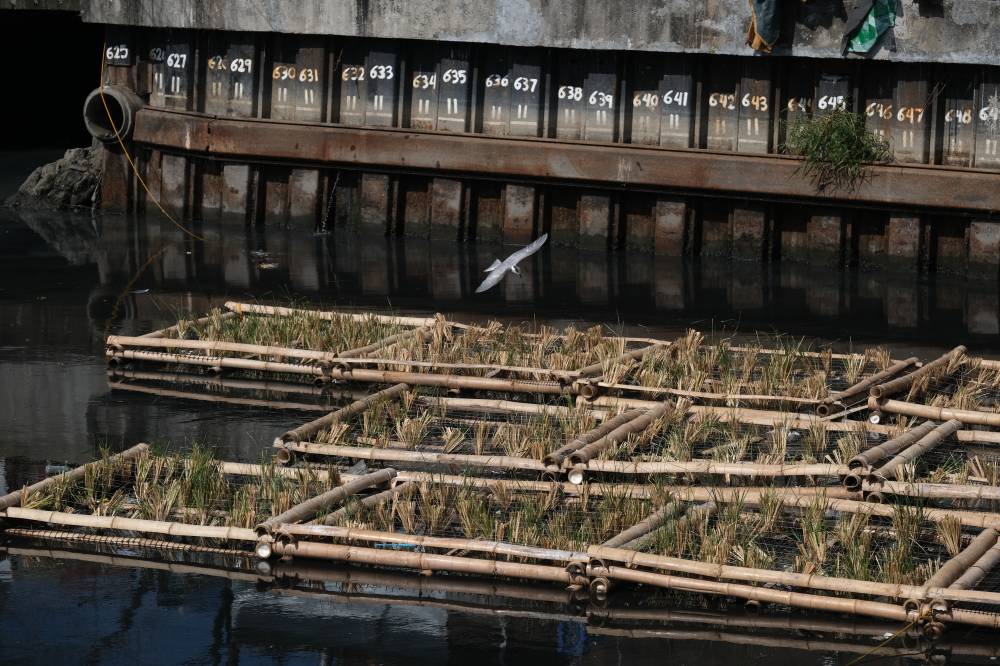
BeOne initiative
Another time that Manarang’s enterprise was able to deploy their vetiver pontoons was when she trained nurses of the Philippine Army on vetiver propagation. She was introduced to the then chief nurse, Col. Maria Victoria “Mimi” Juan, whose project was to nurse the environment.
“We floated the vetiver in the lagoon behind the Army General Hospital, which at the time was kind of polluted, so this is where we [first] collaborated,” Manarang says.
Juan, as chief nurse, did not only pioneer the use of vetiver in the army. She also instituted its first aeromedical evacuation program, which aimed to increase the survival rates of soldiers wounded in combat. It was under her watch that the country’s first-ever air ambulance for soldiers was launched.
Now retired, Juan entered the Aster Guardians Global Nursing Award in 2024. Launched in 2022 by Aster DM Healthcare, it aims to celebrate the nursing profession. Juan even calls it the “Nobel Peace Prize or Miss Universe of accolades for nurses,” with more than 75,000 submitting their registrations.
Banking on her experience in military leadership and community service through environmental projects, Juan won the prestigious award—with $250,000 to boot.
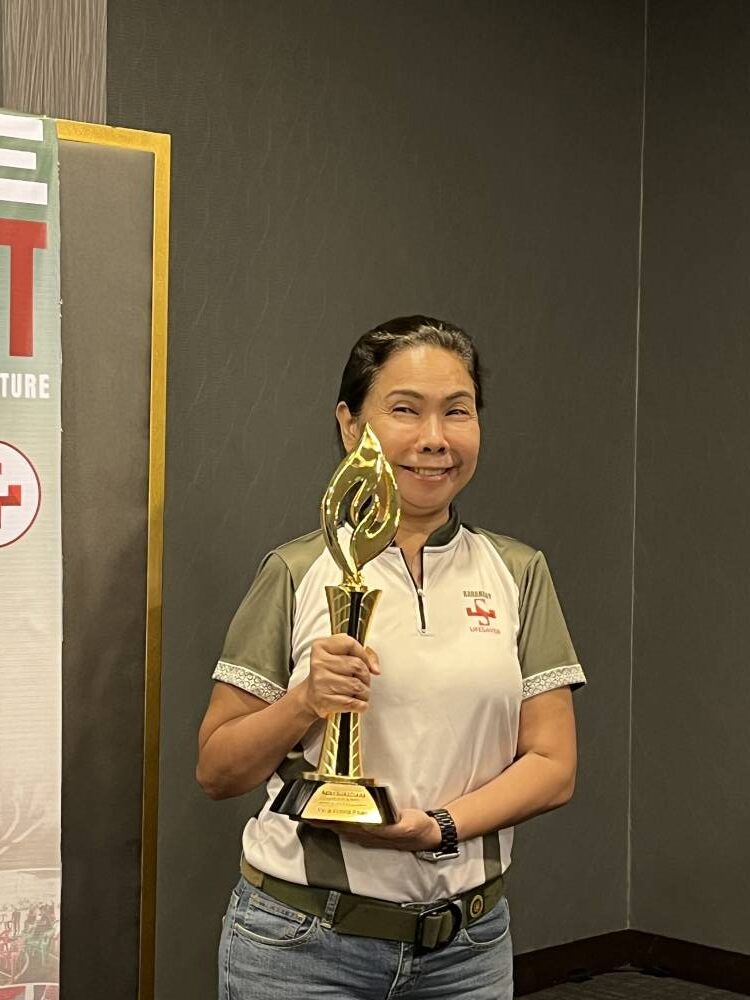
Fresh from her achievement, Juan wasted no time and tied up with Manarang, using some of the prize money in a two-pronged initiative called Barangay Empowerment on Nursing the Environment (BeOne).
It is a combination of Juan’s many advocacies, kicking off with the release of vetiver pontoons along the Pasig near Barangay 190.
This is accompanied by a training session on attending to individuals in highly critical near-death situations, such as bleeding and cardiac arrest. These are the leading causes of what Juan calls “preventable deaths,” according to data from the Philippine Statistics Authority. But theirs is different from the usual first-aid training.
“We should teach [these techniques] simply, not in a manner aimed at nurses and doctors or in a highfalutin way. But for our fellowmen, it should be taught simply knowing that it will have a big impact,” explains Juan about the BeOne initiative.
“If you are aware of how to [attend to these cases], you don’t need to reach us [medical professionals]; you can address even 25 percent of these preventable deaths,” Juan adds.
‘Good karma’
Commenting on this tie-up, Manarang notes how she and Juan go back a long way. “What’s good about this collaboration is that before [in 2018], it was Vetiver Farms Philippines that donated the project to the Philippine army. This time around, they are paying it back. Ma’am Mimi is paying it back by sponsoring our project. So, good karma.”
It may seem that vetiver grass and cardiac arrests are strange bedfellows, but the BeOne convenors note how these are intertwined.
“[Our trainers], especially in far-flung areas, could be far from medical facilities. Our vetiver workers can now be trained in emergency response [through BeOne] … This will be the biggest help to our communities, the added skills especially lifesaving skills for emergencies,” notes Manarang.
Manarang says this BeOne project is dedicated to the #50 Days of Giving of her sorority, the University of the Philippines-born Pi Sigma Delta, which is celebrating its golden jubilee this 2025.
“I saw the root cause. In situations where someone has a risk of trauma that is preventable, the community could do something about it. Same goes for cleaning up bodies of water, or against soil erosion. So why not focus on this, so that our tie-up could impact both the environment and health,” Juan says.
“If we can address the environment [through vetiver grass] … we can lessen soil erosion and natural disasters [that can cause] preventable deaths, aside from communicable diseases that we contract from unsafe environments and unsafe water.”
As for Ponayo, the Vetiver Farms trainer, she is also happy to be part of the BeOne initiative. In a recent press conference introducing BeOne to the media, she and a fellow trainer from Barangay 190 role-played what to do in times of a near-death bleeding emergency.
“I think this [collaboration] will help us a lot. These people that I’ve been with, we not only earn money [from vetiver], but we are also able to realize that—when we’re talking about saving lives—every minute counts.”














